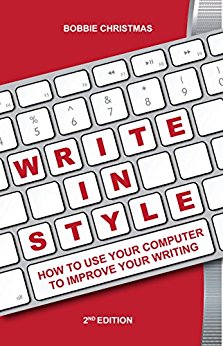 by Bobbie Christmas
by Bobbie Christmas
I devoted an entire chapter to my Bill of Writes for writers in my seven-award-winning book on creative writing titled Write In Style: How to Use Your Computer to Improve Your Writing. Special to WPN, I have agreed to list and explain each item. Below are the final entries in my Bill of Writes, numbers seventeen through twenty. For all twenty-one items, refer to Write In Style, published by BookLogix and available on Amazon.
You Have the Right to Demand Respect for Your Chosen Craft
When I wrote advertising copy, people sometimes asked me, “How are you doing on that little brochure you were writing?” Some said, “Did your client like the cute little commercial you wrote?” Although they may have thought they were flattering me with their interest, their comments annoyed me, but I could not put my finger on why. It finally struck me. By referring to my writing projects as “little,” they were belittling my work. Although some of my projects paid less than others or took less time, none of them have been little to me. They all have importance; they have equal value.
I learned to answer—with a smile on my face—in a way that demanded respect for my work, “That brochure isn’t little. It’s important to my client and to me.”
When appropriate, I responded, “That commercial isn’t little. It’s raking in money for my client.”
An associate of mine told me an in-law of hers said, “Isn’t it nice that your husband supports your little hobby?” My associate’s “little hobby” landed her a good contract with a traditional publisher, and her first novel won three awards: two national, and one statewide. She won Georgia Author of the Year for First Novel, and the book was a BookSense 76 pick. It was nominated for the Townsend Award too. My friend cringed when she heard the words, “little hobby,” and she has a better comeback now, should anyone ever again use such demeaning words to refer to her successful writing career.
No one asks me how my “little” projects are going, anymore. Once you teach others how to treat you and your craft, they will respect what you do.
You Have the Right to Get Feedback on Your Work
Feedback is essential to a writer because we get too close to our own work. We have our own perspective. We think we know what we said.
Only another person can be objective about your work. Others can see flaws, errors, repetition, or inconsistencies you might miss. Find or form a critique circle composed of people whose opinions you respect. Use beta readers. Find an editor you trust.
Get feedback on your work, and your writing will grow by leaps and bounds.
If you want to get feedback or form a critique circle, attend meetings of writing organizations in your town and ask around. Don’t be afraid to announce that you are looking for critique partners; many others are looking too.
You can even make the announcement on the Internet. Look up websites and chat rooms for writers and ask for assistance in return for reading the work of others. You learn a great deal when you help others too.
You Have the Right to Ignore or Reject Unworthy Advice
You can reject or ignore advice. I love this basic writer’s right. You will be bombarded with advice. Sometimes you will even ask for it, as from an editor or a critique partner. Nature instilled in us a stomach for more than one reason, though. Not only will your stomach tell you when to eat, it will also tell you when to listen to advice. Your gut gives you the wisest counsel. Heed what it tells you.
When someone says your point of view is all wrong in your story, listen to what he or she has to say. If the person has a credible reason why you should go to the trouble of changing the point of view, do so. If your gut grinds when you hear that person telling you what to change, though, don’t change it. If several people tell you to change it, you might want to rethink your decision, but one person’s advice is not enough to make major changes that go against what your instinct tells you.
Good friends with good intentions have told me entire books that I ought to write. I tell them the idea is good, and they should write it. My gut says I must write my own books, the ones that cry out to me.
Weigh all advice and make your own decisions. Yes, that advice even means you might not listen to me and all that I say. Great writers, after they have mastered the rules, create their own style and break out of the mold. Follow your heart and your gut and do your best.
You Have the Right to Other and Further Relief
I learned the legal term “other and further relief” when I took a brief job with an attorney’s office in 1966. I fell in love with the vagueness of that term. I interpreted it to mean “anything more that you might be able to get.”
I’ve added to my Bill of Writes the fact that you have the right to other and further relief because you may want other and further relief or guidance or goodies that I haven’t listed, and you have the right to create your own rights.
Bobbie Christmas is a book doctor with twenty-five years of experience and is the author of Write In Style: How to Use Your Computer to Improve Your Craft, winner of seven awards. Her website is www.zebraeditor.com.
